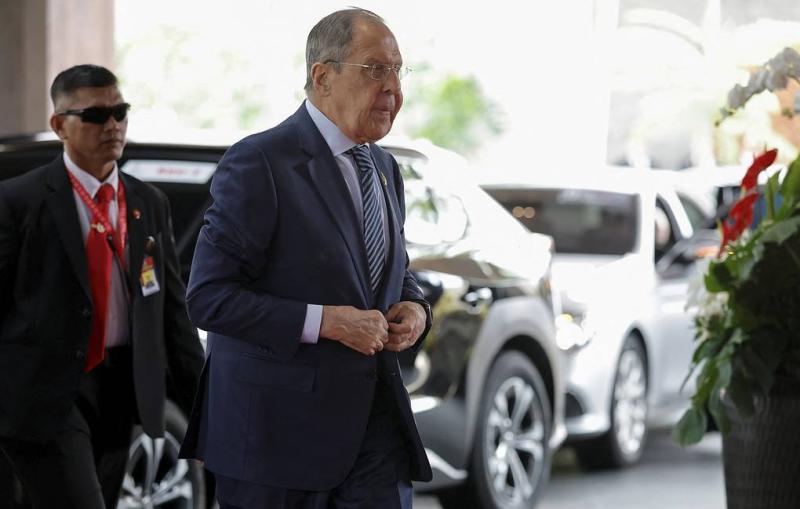
© © Willy Kurniawan/Pool Photo via AP/TASS
New Delhi has hosted a meeting of G20 foreign ministers, and the Russian delegation was headed by Sergey Lavrov. His marathon of bilateral meetings with counterparts from a number of countries has reaffirmed the West’s failure to isolate Russia internationally, hard as it tries to.
Small wonder that the press conference after the meeting witnessed Sergey Lavrov say the West would soon realize that it was isolating itself instead of Russia. Moscow does not feel like this either at G20 events or when holding summits and ministerial meetings under BRICS and SCO or meeting with countries of the Arab League, African Union, and Latin America.
Notably, approval of the New Delhi session summary declaration has failed, just like the one at last week’s forum of finance ministers and central bank chairmen in Bangalore. A statement to this effect came on March 2 from Sergey Lavrov right after the closed-door session, referring to disputes over Russia’s special military operation in Ukraine. As the Indian Foreign Ministry noted, the document’s relevant paragraphs were not agreed upon by all the member states because of provisions outlined by Russia and China.
Sergey Lavrov's speech before his G20 colleagues was surprisingly tough. This is what he said, among other things: "I would like to apologize to the Presidency and our colleagues from the Global South for the improper behavior of a number of Western delegations, which turned the discussion on the G20 agenda into a travesty in an attempt to shift their responsibility for failures in economic policy to others, primarily Russia."
During his speech, the chief Russian diplomat supported "building a common future for humanity," urged to abandon dictate in the global scene, "put a stop to illegitimate sanctions, all forms of violations of freedom of international trade." He said the West was blatantly "burying the UN Secretary-General’s well-known humanitarian initiative" on the gratuitous transfer of Russian fertilizers to African countries. There are no obstacles to exports of agricultural products to Russia, despite all the EU attempts to convince the world community otherwise, he stressed.
Acting within BRICS, the SCO and the EAEU, we are committed to form reliable transport corridors and independent payment systems and to expand settlements in national currencies, Lavrov said. He also pointed to Russia's vital engagement in an honest and swift investigation into the terrorist attack against Nord Stream pipelines. Moscow is "shocked to see the masterminds behind the act of sabotage… within the NATO and the EU area of responsibility get away with what they did."
Every single G20 statement by Sergey Lavrov was relevant and essential for apprehending Russia's stance on the key international issues, including the conflict in Ukraine. At the same time, the Russian Foreign Minister’s bilateral meetings with his BRICS (India, China, Brazil) and Turkish counterparts were no less important to our country.
Thus, March 1 saw him talk to Indian Foreign Minister Subramanyam Jaishankar during a working breakfast at the Hyderabad Palace. During the conversation, the sides exchanged views on bilateral cooperation and G20 issues, namely trade, investment, transport and logistics cooperation, transition to national currencies in reciprocal payments, and energy projects.
The very same day, Lavrov met with his Turkish counterpart Mevlut Cavusoglu to discuss the grain deal expiring on March 18. The Russian foreign minister said it could be extended only in case of removed restrictions on the export of Russian agricultural products and fertilizers to global markets. The agenda also comprised Moscow’s assistance to Ankara in remedial actions after the recent earthquakes, and normalization of Turkish-Syrian ties.
And on March 2, Sergey Lavrov met with China’s new Foreign Minister Qin Gang, who took up the post a mere two months ago. The diplomats discussed Ukraine, including Beijing's stance on a political settlement for the crisis, and also considered a number of pressing international issues. Both expressed satisfaction with the high development rates of their countries’ political dialogue and actual cooperation. The two diplomats also pointed to the importance of strengthening close foreign policy coordination between Moscow and Beijing on various international platforms, including the UN, SCO, BRICS, APEC and others.
As demonstrated by the G20 ministerial discussion of key issues, as well as Sergey Lavrov and Qin Gang’s first personal meeting, stances taken by Russia and China converge to a great extent, fueling confidence that Beijing will keep marching in step with Moscow in international affairs.
Speaking about the meeting in New Delhi, one cannot help mentioning the failed "sensation" reported by some Western media, i.e. Sergey Lavrov's talks with US Secretary of State Anthony Blinken. They were sitting far apart at the central meeting but crossed paths behind the scenes and, as requested by the American side, had nothing but a breezy conversation. Associated Press wrote Blinken said the United States would go on with backing Ukraine, urged Moscow to reconsider its suspended participation in the New START Treaty and release US citizen Paul Whelan, convicted of espionage in Russia. Still, the American Secretary of State is not reported to have somehow commented upon the Russian minister’s response.
According to Foreign Ministry spokeswoman Maria Zakharova, as the US has pushed diplomacy aside and advocates for any conflict escalation worldwide, the meeting between Lavrov and Blinken at G20 was an obviously planned occasion. In general, things played out that very way — we have no intention to dance attendance on the Americans.
In conclusion, let’s note that the G20 foreign ministers’ meeting in New Delhi revealed a debacle of the current international relations architecture over Western tendency to ignore any clear-eyed arguments or the emerging brand-new multipolar world.









